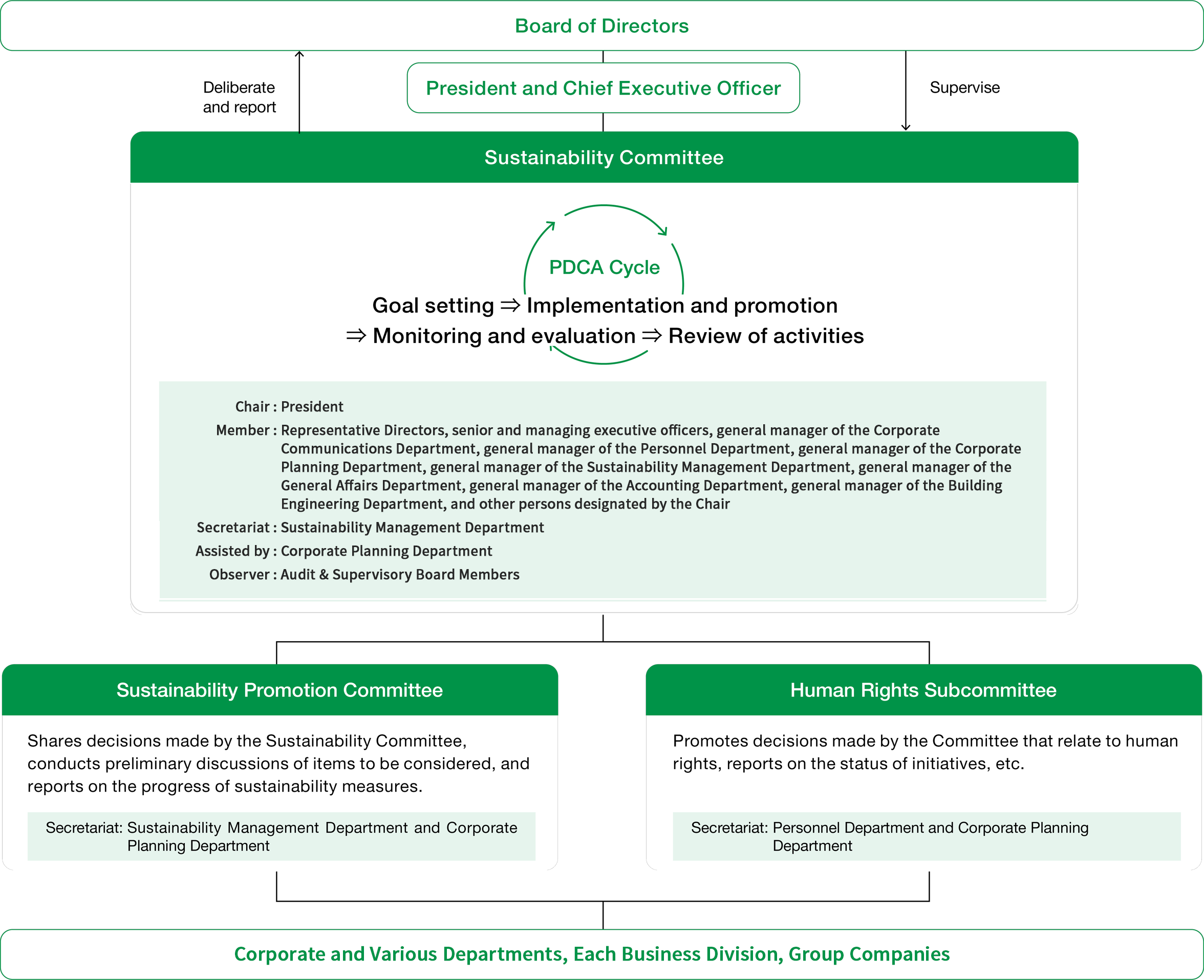Sustainability Promotion Framework
Sustainability Promotion of the Tokyo Tatemono Group
We live in a time of profound change. We are experiencing shifting demographics, growing diversity among personal values, ever-accelerating technological development, and more. Amidst these uncertainties, a broad range of challenges to achieving social sustainability have emerged. At the Tokyo Tatemono Group, in order to fulfill the role required of us as a developer, we have set forth our long-term vision for 2030, "Becoming a Next-Generation Developer," and aim to be a good company for all stakeholders. We will achieve this by striking a high level of balance between solving social issues and growing as a company.
On our path to realizing our long-term vision, we have identified materiality with an awareness of our shared values with society that we realize through our business. To realize sustainability management, which is one of our shared values with society, we have established a framework centered on the Sustainability Committee and are working to promote and enhance sustainability initiatives throughout the Group.
In addition, in our Medium-term Business Plan (FY2025 -2027) formulated to realize our long-term vision, we have set Sustainability (Environment, Society, and Governance) as a key factor for Evolution of management Infrastructure to support growth. We will continue to promote a range of sustainability initiatives that contribute to the solution of material issues.
Governance
To consistently pursue sustainability measures across the entire Group, Tokyo Tatemono established the Sustainability Committee, chaired by our president. The Sustainability Promotion Committee and Human Rights Subcommittee were also established under the Sustainability Committee. The Sustainability Committee, like the Executive Committee, Risk Management Committee, and Internal Control Committee, is under the direct control of the president. It meets in principle at least twice a year to deliberate and discuss matters related to the formulation of the Group's sustainability policies, the development of systems, the setting of indicators and targets, and the monitoring and evaluation of progress. Important matters deliberated and discussed by the Sustainability Committee are submitted to or reported to the Board of Directors, which makes decisions on important sustainability-related matters, monitors the implementation status of individual measures, and supervises the overall promotion of the Group's sustainability initiatives. The Sustainability Promotion Committee shares decisions of the Sustainability Committee, under which it sits, conducts preliminary discussions for consideration, and reports on the progress of the Group's sustainability measures.

Frequency of Meetings and Main Agenda Items of the Sustainability Committee (FY2024)
|
Theme |
Times held |
|---|---|
|
Progress toward material issue (environmental and social) KPIs and targets (PDCA Cycle Management) |
2 |
|
Progress of supply chain management initiatives (PDCA Cycle Management) |
Risk Management
Tokyo Tatemono has established a Risk Management Committee chaired by the president to oversee risk management for the Tokyo Tatemono Group. At the Risk Management Committee, we formulate annual risk management plans, evaluate and analyze material management risks (priority risks), formulate preventive measures and countermeasures, and periodically monitor the status of countermeasures. Also, we have created a system to oversee risk management for Tokyo Tatemono, where the Tokyo Tatemono president is the Chief Risk Management Officer, and department general managers are Risk Management Officers.
With regard to sustainability-related risk management, the Sustainability Committee works with relevant departments to manage risks and reports important matters on the status of implementation to the Risk Management Committee. Important matters deliberated by the Risk Management Committee, such as the risk management structure, policies, and annual plans, as well as the status of risk management efforts, are regularly submitted to or reported to the Board of Directors. The Board supervises the effectiveness of the Group's overall risk management, including sustainability-related risks.
